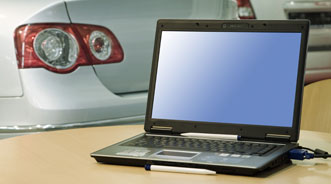Survey: Consumers Looking for Enhanced, Customized Online Vehicle-Shopping Experience

By subscribing, you agree to receive communications from Auto Remarketing and our partners in accordance with our Privacy Policy. We may share your information with select partners and sponsors who may contact you about their products and services. You may unsubscribe at any time.
NEW YORK –
With results that prompted orchestrators to classify the auto industry as “notably lagging other sectors in the eyes of the consumer,” a new global survey by Accenture showed potential buyers are bouncing from site to site and turning to a variety of online and offline services to help them decide on which vehicle to purchase.
The survey of 13,000 drivers in 11 countries found that consumers believe the buying process would be simpler and quicker if the content on industry websites was customized to be more relevant to their specific vehicle-buying preferences.
Respondents also wanted the industry to adopt such online innovations as Web chat and mobile-enabled websites, which the firm insisted are used widely in other retailing sectors.
Of the survey respondents who say they research their purchases online before buying a vehicle, 78 percent visit at least six websites or more first, and 15 percent say they need to browse more than 20 websites to get the information they seek.
In addition, 75 percent say they still turn to more traditional offline media for the information required to make a vehicle-buying decision.
Accenture said the findings demonstrate a lack of integrated digital marketing among manufacturer and dealer sites in the automotive industry.
Subscribe to Auto Remarketing to stay informed and stay ahead.
By subscribing, you agree to receive communications from Auto Remarketing and our partners in accordance with our Privacy Policy. We may share your information with select partners and sponsors who may contact you about their products and services. You may unsubscribe at any time.
More than three quarters (80 percent) of the respondents would like more intuitive, customized content made available to them, while 75 percent favor a process that will enable them to obtain more simplified information online.
Nearly three quarters (73 percent) would like the comparison process simplified, and 68 percent would welcome the ability to chat online with a dealer.
“A consistent customer experience is vital to the online-offline sales process, an area in which the auto industry is notably lagging other sectors in the eyes of the consumer,” said Luca Mentuccia, global managing director of Accenture’s automotive industry group.
“Consumers have made it clear that they want better online support, advice and personalization when buying a car with consistent handoffs to the dealer when they are ready to visit the showroom,” Mentuccia continued. “At a time when digital marketers are utilizing algorithms to predict what online visitors want to know, automakers should be better able to shape Web content that is more user-centric.”
According to the survey, most respondents (88 percent) also want easier and clearer pricing to help expedite the vehicle-buying process, while 77 percent want dealers to provide them with a simpler way to configure a vehicle.
More than three quarters (76 percent) would like to have the ability to compare additional options with the same automaker’s product line and 75 percent would welcome more mobile-enabled websites.
Additionally, 74 percent desire better integration between dealer sites and inventory search functions.
“In our experience, car buyers are open to post-sales activities such as loyalty program memberships and enrollment in maintenance plans,” Mentuccia said. “Success with these programs can be enhanced through the use of customized landing pages that are based on customer demographics, personal preferences and previous interactions. However, our research shows that consumers believe the auto industry has a way to go to enhance digital marketing.”
Better Digital Marketing Sites Key to Future Vehicle Buying
According to the survey, 82 percent of the respondents believe that better interactive digital marketing is a must for the auto industry, and 83 percent agree that improved digital media would significantly reduce the time needed to purchase a vehicle.
In addition, more than three quarters of consumers (76 percent) feel that the auto sector significantly lags other retail industries in the use of digital media tools such as video and 360-degree website tours.
“Accenture believes that putting digital marketing to better use could yield an increase in topline sales for the automotive sector of 1 to 2 percent,” the firm said.
In terms of the major influencers that impact their vehicle-buying decisions, survey respondents essentially gave equal weight across the board to manufacturer sites (53 percent), the recommendations of friends and colleagues (54 percent), social media (56 percent) and advice from family (59 percent).
“The wide range of influencers with no discernible ‘leader’ demonstrates the extent to which consumers are constantly assessing their car purchases,” Mentuccia said.
“Consumers are in a constant state of purchase evaluation, which is changing the traditional boundaries of marketing and customer loyalty,” Mentuccia continued. “Through the sophisticated use of digital technology, automakers and dealers could better interact with their customers and have a stronger online influence in the buying process.”
Impact of Social Media in the U.S.
Accenture mentioned one point specific to U.S. respondents.
According to the survey, American drivers are the most likely to turn to social media when buying a vehicle as 94 percent use social media reviews as part of their online searches, compared with only 58 percent of consumers in India.


